Penny Candy
A Memory For My Heart
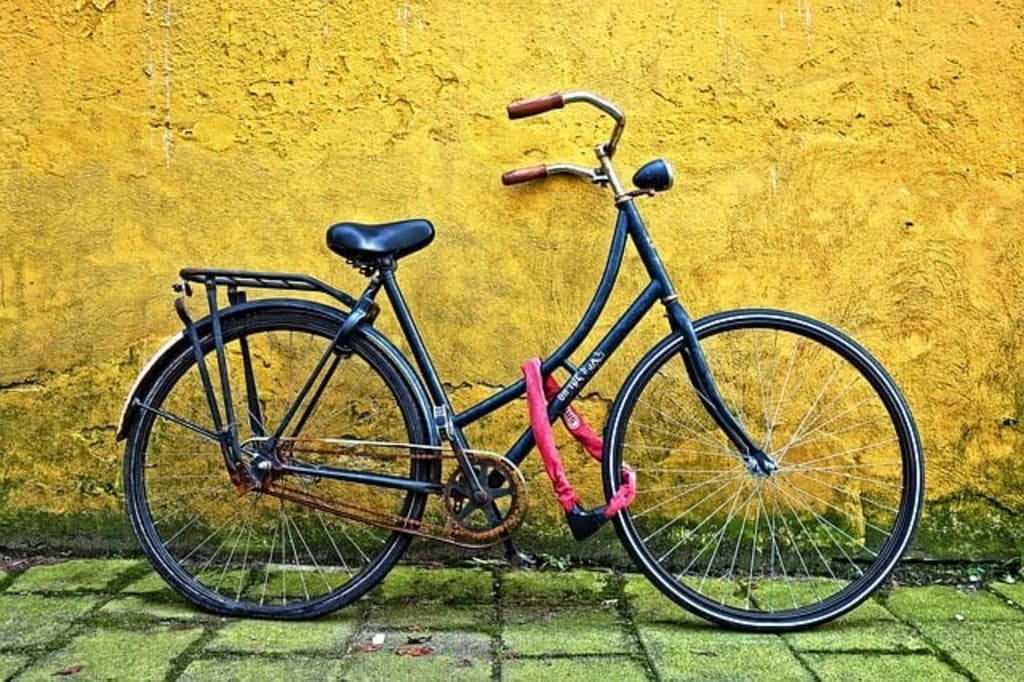
Since the first trip to the city with Dad and Morty, I hadn’t been allowed to go back. “You’re too young to see all that destruction,” Dad said.
What he really meant was I was too young to see all the dead bodies.
While many conversations between Dad and me ended in arguments, this wasn’t one I was anxious to pursue. I was only seven years old, and I didn’t much care for running into bodies if I didn’t have to.
There were parties of grownups, mostly men, who went to the city to salvage whatever could be found to keep the community in our compound going. Grandpa and his people had equipped their places well, but everyone knew nothing was going to last forever.
People in the city were gone–or dead. They didn’t need things now, either way. But getting access to those things was a lot of work. The place had been bombed out; buildings had collapsed; roads were impassable. It was a tangled up mess. And yes, there were bodies.
Mortimer was one of the younger grownups. He had taken in Sidney and Ashley, who had lost their family. I’m pretty sure he’s my cousin somewhere along the line, but even if he’s not, he’s family. He famously hated his name; we called him Morty or Mort instead.
Morty held the opinion that it wasn’t always necessary to go salvaging in the big city. There were several small hamlets in the surrounding area as well. These had been deserted, for the most part, and he convinced Dad and Grandpa that taking a few of us along with him was okay. Everyone could do their part in getting supplies for the group.
Of course, in retrospect, I know Morty didn’t take us in cold; he cased the places and removed bodies first, before taking a group of kids in to salvage.
One morning Morty gathered a few of us together and loaded us into a big extended-cab long-bed pickup truck. He’d recruited Zach and Jacob, who were a couple of the older boys he had rescued from the base. They were, by then, about 14 or 15; while I had reached the ripe old age of 9-ish. Sid was with us, and so were Mae and Ash.
We rode for over an hour on 2-lane blacktop that wound through the forest, and we knew we’d find a little town waiting for us sooner or later. Morty liked the small out-of-the way communities. I think he must have had hope, every time he found one, that there would be people. I know I felt that way a lot of the time.
The town was tiny; there was a general store/gas station/post office—it said so, on the sign. There were half a dozen little houses and three mobile homes, and a small wooden building that declared itself “Murphy’s Bar and Grill”.
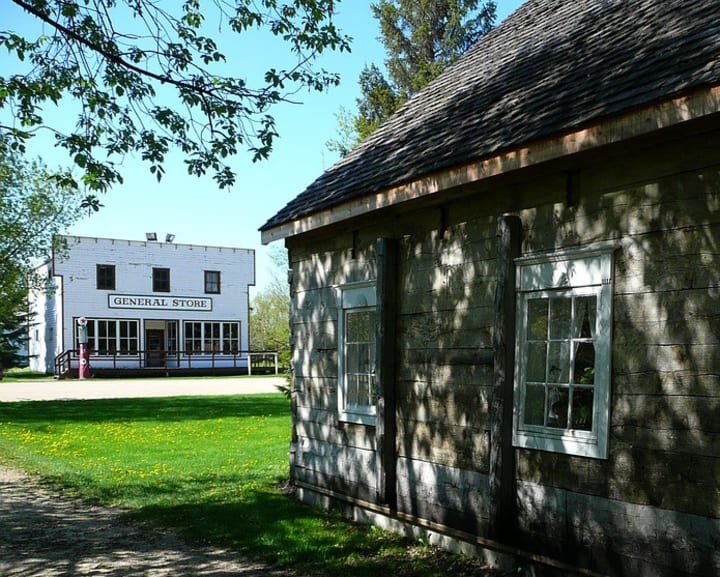
“Metropolis,” Zach grinned, swinging around in his seat to speak to us.
“Hardly,” I retorted.
“Don’t be so literal, Penny,” Mort said.
He was right; I can be tedious sometimes.
“Are there any people here?” Mae asked.
“Nah,” Jacob replied. “Not a car in sight.”
That was true. I wondered if we’d find anything here. People who drove away from their homes generally took everything they could load up with them.
We got out and started our searches.
Morty and Zach started with the gas station. If fuel could be found, Mort would come back with a pump truck and get it.
Jacob headed for the bar and grill, carrying a couple of bags with him.
Sid, Ash, Mae and I headed for the houses.
I liked looking at houses. We had lived in a base house–really a duplex–before the end, and I liked the different layouts in some of the houses we had gone into since then. I harbored a hope that one day I could live in a real house, instead of an underground compound space.
My mother had always been an environmentalist, so she had collected quite an assortment of cloth shopping bags. When she was getting things ready for us to move to the compound—before the men with guns put an end to that plan—she had packed assorted canned goods, dry goods and even clothing and toys in the bags and put them in her van. Morty drove us away in that van on the night he rescued everyone. Whenever we went out to salvage, Mae and I took her bags with us.
Today, though, I was carrying my new favorite bag. It hadn’t been one of Mamma’s; Sid found it while out with my father and grandfather one day, and I loved it. It was printed on all sides with pictures of books, and captioned: “Give Me Library, or Give Me Death”.
Sid gets me.
The first house we went to was really small; I suppose it would be called a cottage in some storybook. The door was unlocked, and we went inside.
There wasn’t much to see. Whoever had lived there had left a small flower-print loveseat behind. It sat askew on three legs. Asher sighed, looking at it. “That could be fixed, I bet,” he mused. He sat down on it, and puffs of heavy dust rose around him. He wrinkled his nose and waved his hand in front of his face. He fought it, but finally let out a good sneeze. “It’s comfortable,” he offered weakly, and Mae started to giggle.
Sid said, “We don’t need it.”
Sid and I wandered into the kitchen while Mae helped Ash dust himself off. We went through cupboards and drawers, looking for canned food and any useful items we might find. We all checked closets and bathroom shelves, and I snagged a very nice shower curtain, rod and rings. It featured a lighthouse and beach scene, and I thought it would look great in my doorway. There were no actual doors in the compound, and privacy was jealously guarded.
Mae found a plastic-wrapped towel set in the back corner of a bathroom shelf, and tucked it into her bag.
I opened all the bathroom drawers, and when I pulled out the bottom drawer I saw a tarnished chain. When I tugged on it, a heart-shaped locket slid into view. It had a big red stone and what looked like wings or something.
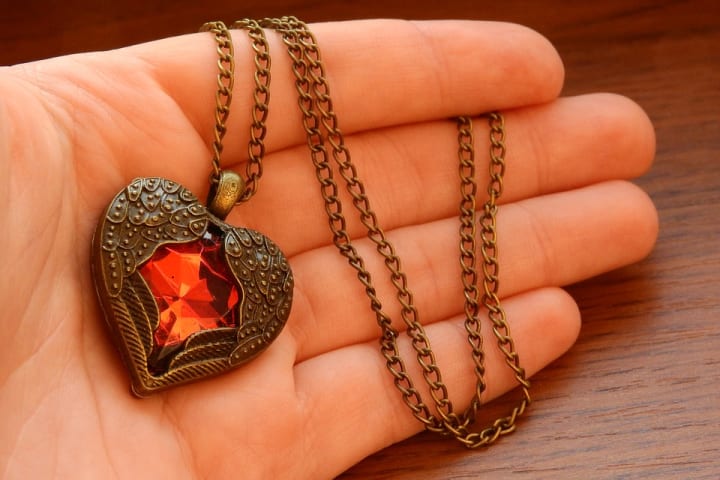
“Oooh,” May crooned. “What is it, Penny? Is it an angel thing?”
“Looks like a locket.” I turned it in my hand, only mildly curious, and handed it to Mae.
“What’s a locket?” She examined it closely.
“It should open up, like a book,” I said. “See the hinge?”
“Uh huh.” Mae slipped her thumbnail between the two sides and popped it open. “It’s a clock!”
“Hmm.” I wondered if it would work. Even if it didn’t, Mae was enchanted. She closed the locket and pulled the chain over her head. It wasn’t too long; the locket rested just below her breastbone.
“Is it pretty?”
“Sure thing.”
“I gotta show Ash!” She ran out to show her friend.
We hadn’t found much in the way of food, so we went out the back door and headed toward the next house. As we went around the side of the house, I saw it: An older model bicycle leaning against a sunshine-yellow stucco wall. The body of the lady’s bike was still black and shiny, but the chain had rusted. There was a plastic-wrapped lock chain looped through the front tire.
I stopped in my tracks and sat down hard. I’d been struck by one of those famed “Déjà vu” moments which, up until now, I had only read about but never experienced:
The street in front of our duplex on the base on a sunny fall day; Mamma wheeled her old bicycle in a not-so-graceful manner. She was heavily pregnant, and it was a bit alarming to see her pumping those pedals and giggling at me as I attempted to emulate her now that I had insisted that my training wheels be removed.
Mae, astride a bright red tricycle, barreled up and down the sidewalk, singing “The Wheels on the bike go round and round.”
“It’s ‘bus’,” I called, shakily maneuvering my way past her, avoiding the deep gutter that would surely topple me into the street.
“Not today,” Mae said.
Mamma passed me, turned and came back toward me and smiled brilliantly as she picked up speed. She looked so happy. I no longer thought she would fall; she had gained control of her bike in spite of her added girth.
After a few more passes, she pulled to a stop and announced, “Gotta pee! You’re doing so great! You’re a pro, kiddo. You too, Mae!” She waddled quickly up the steps to the door. “Can’t wait a single second! Will you lock her up for me, please, Penny Candy?”
God. I had forgotten she used to call me that. Stunned by the sudden crystal-clear memory of the day, I burst into tears.
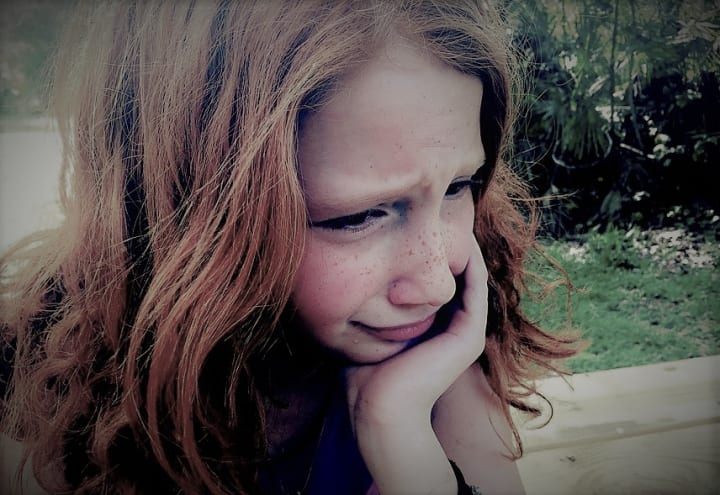
Mae knelt down and threw her arms around me. Sid and Ash joined us on the ground, and after a couple of embarrassing moments, I was able to explain my reactionary outburst.
Sid patted my shoulder awkwardly. “I’ll load it in the back of the truck,” he said.
“We don’t need it,” I protested.
“Yeah,” he said, “you do.”
With the front wheel locked, there was no way to roll it, so the boys picked it up and hauled it to the truck. I sat on the ground with Mae, feeling drained and tired.
“I don’t remember that,” Mae said. “I wish I did. It’s a good memory, Penny.”
“It is,” I agreed. I had neglected—deliberately—to tell them my old nickname. Remembering it had been a shock, but now I felt like that particular memory was mine alone. I would keep it in my heart. That’s where it belongs.
Penny and her entourage are continuing characters who inhabit a lot of my dystopian tales. Their origin story can be found in my novella, Starting in the Middle of The End:
For more of Penny and company, visit my blog at Penz-O-Paula.
If you enjoyed this story, I would appreciate it if you would click on the heart button below and let me know.
Tips, while never expected, are certainly VERY appreciated.
About the Creator
Paula Shablo
Daughter. Sister. Mother. Grandma. Author. Artist. Caregiver. Musician. Geek.
(Order fluctuates.)
Follow my blog at http://paulashablo.com
Follow my Author page at https://www.amazon.com/Paula-Shablo/e/B01H2HJBHQ



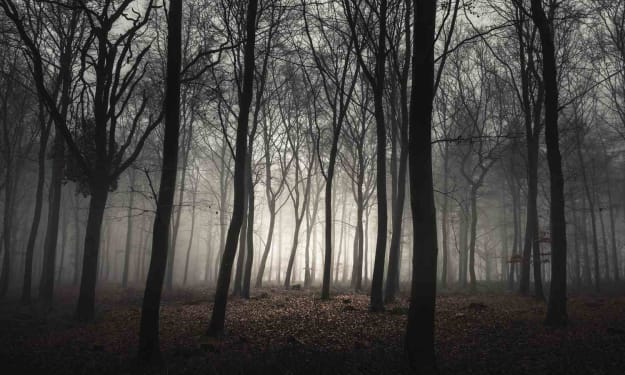


Comments
There are no comments for this story
Be the first to respond and start the conversation.